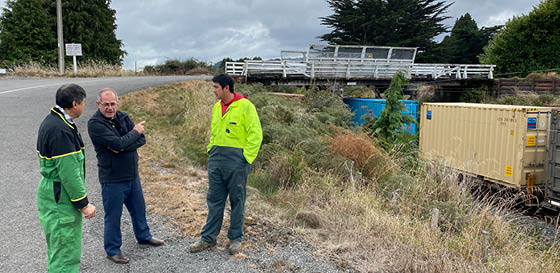Mon 5 May 21
Following a decision to introduce new restrictions and compliance cameras on the Mangateitei Rd rail over-bridge between Ohakune and Rangataua local growers and contractors made an urgent appeal to Council to find a solution that wouldn't force them to risk their safety and criminalise them just to operate their business.
Mayor Don Cameron said the issue highlighted the problem facing many rural councils where they are balancing the need to renew infrastructure critical to keeping the economy open against affordability.
Mangateitei Rd was one of two wooden rail over-bridges, along with another on Ruapehu Rd, where we have had to introduce new restrictions following recent engineering reports that have increased our safety concerns for bridge users.
Technically these two bridges should have been replaced some time ago, however, Waka Kotahi NZ Transport Agency (NZTA) funding criteria means we have so far been unable to unlock our 75% co-investment subsidy, despite the bridges now being functionally useless to the freight movement critical to our agricultural economy.
In the case of the Mangateitei Rd bridge this is a significant issue as it is the only option for the local growers, farmers and forestry who rely on it, and supply produce nationwide and for export, including 20% of New Zealand's carrots and potatoes.
We have budgeted our $1.2m (25%) local share of the $4.8m replacement cost for the bridges in our latest 2021/31 Long Term Plan although they need to compete for regional transport funding in an environment where Waka Kotahi NZTA are cutting spending, he said.
Mayor Cameron said this issue highlighted the problem that many rural councils like Ruapehu are facing who have a number of old bridges built in the early half of last century to open up agricultural production that are now in need of replacement.
These old, aging, structures help support the rural backbone of New Zealand's economy that feeds the nation and are critical to exports as we recover from COVID19.
In our case we have a significant stock of 341 aged bridges including large culverts, the majority of which were built around 100 years ago, across a 350km road network of which two thirds is unsealed.
Multiply this situation across rural New Zealand there is likely to be a large bow wave of aging bridge stock vital to the economy that small regional councils cannot afford to renew, he said.
Mayor Cameron noted that Council is constrained in 100% debt funding the replacement of bridges such as Mangateitei as like many other councils with a small rating base we are already facing debt affordability challenges.
As it stands, without further Government assistance, our debt level over the ten years of our new Long Term Plan is already projected to grow to an uncomfortable $100m driven mostly by the mandated water quality reforms.
Accelerating our bridge renewal program without the co-investment from Waka Kotahi NZTA at time when we are already committed to meeting legislated water quality upgrades would hasten affordability issues for Council.
Additionally, we look at our agriculture and productivity as a whole across the road network rather than looking at individual roads and bridges and how much produce comes off each one.
A change to this later approach would mean there are very likely some roads and bridges that we would never be prioritised for replacement leaving some remote farms and communities severely disadvantaged.
We are currently in active discussions with Waka Kotahi NZTA over funding and are hopeful that due to the threat that restrictions on the Mangateitei Rd rail over-bridge have to disrupt the supply of produce nationwide it will be seen as a special case and treated with urgency, he said.
*END*


